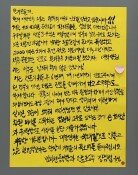First Korean wins Man Booker International Prize
First Korean wins Man Booker International Prize
Posted May. 18, 2016 07:20,
Updated May. 18, 2016 07:26
Novelist Han Kang has won the Man Booker International Prize for fiction for the first time as a Korean. The Man Booker Prize selection committee announced Monday in London the joint winners of book "The Vegetarian," author Han and U.K based translator Deborah Smith. The committee praised the book as haunting, strong and original. Man Booker Prize's International part was launched in 2005 and has announced winners every two years but changed to select the winner every year starting this year. Han beat five strong contestants including Orhan Pamuk, novelist and recipient of the 2006 Nobel Prize in Literature, and China's Yan Lianke, contributing to raising the status and pride of Korean literature.
"The Vegetarian" is an unsettling novel in which a woman's decision to stop eating meat has devastating consequences. Published in 2007 in Korea, the book was translated into English in January last year to garner praising remarks by major global media including the Guardian. The translator who only began learning Korean for less than seven years translated the frightening mixture of beauty and fear, to add vigor to the original Korean book that contained a story of violation and wounds, a universal theme of human beings.
Translation is very important to arouse empathy by global readers. Man Booker splits the price money (50,000 British pounds) by half to the author and the translator for this reason. Han Kang, daughter of novelist Han Seung-won, said, "There are many outstanding fellow and senior writers in Korea, and I was lucky to have met an excellent translator and editors." This success case should be spread broadly for Korean literature to grow further and make presence in the global stage.
Many Koreans look forward each year to hear news of a Korean Nobel laureate. Early this year, U.S. current events magazine New Yorker posted an article criticizing that Koreans want a Nobel laureate but don't actually read books. While it is important to gain recognition overseas, priority should be making a fertile ground for Korean literature. The latest victory should serve to lay ground based on which Korean literature's values are highly acknowledged.
고미석기자 mskoh119@donga.com
Headline News
- Med professors announce intention to leave hospitals starting Thursday
- Bridge honoring Sgt. Moon Jae-sik unveiled in Pennsylvania
- Chief of Staff Chung tells presidential secretaries to stay away from politics
- US FTC bans noncompete agreements
- N. Korea launches cyberattacks on S. Korea's defense companies







